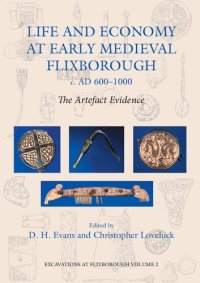
Ebook: Life and Economy at Early Medieval Flixborough, c. AD 600-1000: The Artefact Evidence
- Genre: History // Archaeology
- Series: Excavations at Flixborough 2
- Year: 2009
- Publisher: Oxbow Books
- City: Oxford
- Language: English
- pdf
With contributions by Marion M. Archibald, Paul Blinkhorn, Michelle P. Brown, Jane Cowgill, Rosemary Cramp, Brenda Dickinson, Peter Didsbury, Glynis Edwards, Vera I. Evison, Martin Foreman, Geoff Gaunt, Kay Hartley, John Hines, Jennifer Jones, Christopher Loveluck, Peter Makey, Bill Marsden, Catherine Mortimer, Sonia O'Connor, T. P. O'Connor, Elisabeth Okasha, Patrick Ottaway, Ian Panter, Jonathan Parkhouse, Tim Pestell, Elizabeth J. E. Pirie, Nicola Rogers, Bryan Sitch, David Starley, Gabor Thomas, Alan Vince, Penelope Walton Rogers, Lisa M. Wastling, Jacqui Watson, Jane Young and Susan M. Youngs. Principal Illustrators: Mike Frankland, Zoe Patterson, John Marshall, Rebecca Smith and Leslie Turner.
Between 1989 and 1991, excavations in the parish of Flixborough, North Lincolnshire, unearthed remains of an Anglo-Saxon settlement associated with one of the largest collections of artefacts and animal bones yet found on such a site. In an unprecedented occupation sequence from an Anglo-Saxon rural settlement, six main periods of occupation have been identified, dating from the seventh to the early eleventh centuries; with a further period of activity, between the twelfth and fifteenth centuries AD. The remains of approximately forty buildings and other structures were uncovered; and due to the survival of large refuse deposits, huge quantities of artefacts and faunal remains were encountered compared with most other rural settlements of the period. Volume 2 contains detailed presentation of some 10,000 recorded finds, over 6,000 sherds of pottery, and many other residues and bulk finds, illustrated with 213 blocks of figures and 67 plates, together with discussion of their significance.It presents the most comprehensive, and currently unique picture of daily life on a rural settlement of this period in eastern England, and is an assemblage of Europe wide significance to Anglo-Saxon and early medieval archaeologists.
Between 1989 and 1991, excavations in the parish of Flixborough, North Lincolnshire, unearthed remains of an Anglo-Saxon settlement associated with one of the largest collections of artefacts and animal bones yet found on such a site. In an unprecedented occupation sequence from an Anglo-Saxon rural settlement, six main periods of occupation have been identified, dating from the seventh to the early eleventh centuries; with a further period of activity, between the twelfth and fifteenth centuries AD. The remains of approximately forty buildings and other structures were uncovered; and due to the survival of large refuse deposits, huge quantities of artefacts and faunal remains were encountered compared with most other rural settlements of the period. Volume 2 contains detailed presentation of some 10,000 recorded finds, over 6,000 sherds of pottery, and many other residues and bulk finds, illustrated with 213 blocks of figures and 67 plates, together with discussion of their significance.It presents the most comprehensive, and currently unique picture of daily life on a rural settlement of this period in eastern England, and is an assemblage of Europe wide significance to Anglo-Saxon and early medieval archaeologists.
Download the book Life and Economy at Early Medieval Flixborough, c. AD 600-1000: The Artefact Evidence for free or read online
Continue reading on any device:

Last viewed books
Related books
{related-news}
Comments (0)